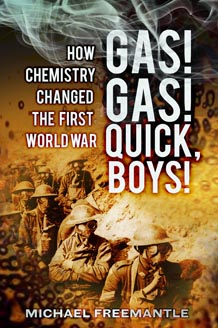
Gas! GAS! Quick, Boys! How Chemistry Changed the First World War (The History Press)
New book reveals chemistry’s impact on Great War
The impact made by chemistry on World War I has been chronicled in a new book by alumnus Dr Michael Freemantle (Chemistry 1964).
Gas! GAS! Quick, boys! How Chemistry Changed the First World War shows how chemistry underpinned the war with its use in bullets, shells, bombs, poison gas attacks and tunnelling operations through to the anaesthetics, antiseptics and painkillers used to treat the sick and wounded.
Michael, who is a Fellow of the Royal Society of Chemistry, explains for the general reader what mustard gas, guncotton, lyddite and other chemicals used in the war were and how they were employed in what is sometimes known as the 'Chemists’ War'.
“The Great War was dominated by the industrial-scale application of chemicals as a destructive force,” he said. “Some of the worst horrors we associate with that conflict were a direct result of the use of chemicals, particularly explosives and toxic gases.
“We perhaps forget though that this war also used chemicals for good – the widespread use of anaesthetics, medicines and disinfectants for instance, which undoubtedly saved lives.”
Michael has extensive experience as a writer in his former roles as editor of Chemistry International magazine, senior correspondent for Chemical & Engineering News and Science Writer in Residence at Queen’s University Belfast. He now blogs for the Huffington Post.
He added: “I’ve written numerous books and articles about chemistry throughout my career and have also had a fascination with the First World War, so it was natural that the two should come together to create this book.”
Date: 13 December 2012
